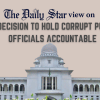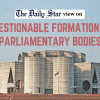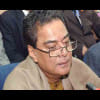Disclosure of assets by state officials a much-needed step

We commend the interim government for its instruction to all government employees to submit their wealth statements. A senior secretary at the Ministry of Public Administration has also warned that those who will not do so will face punishment. Currently, public employees are required to declare their movable and immovable assets at the time of joining the service, and later to submit wealth statements every five years. However, in reality, they hardly comply with these rules. The lack of accountability has given rise to corruption in many forms. So, making asset disclosures mandatory is a welcome step indeed.
It may be recalled that when the Government Servant (Conduct) Rules-1979 was formulated, government officials were required to submit wealth statements every year. But in 2002, the rules were amended to extend the period of disclosure to five years. On what justifications were the rules changed still remains a question. But then, as if to give public officials a further scope to get involved in corruption, the public administration ministry earlier this year pushed for a change that would have done away with the obligation to submit wealth statements, instead proposing that employees' asset records be collected from their annual tax returns filed with the National Board of Revenue. Clearly, these amendments and proposals were made to grant concessions to public employees.
Over the past few decades, we have seen how corruption has spread in every sector in the country, from banking to health to energy to transport to construction. Corruption in the public sector is primarily enabled by public officials, and it starts with their very recruitment process. We have recently come across many reports on how question paper leaks have become a regular phenomenon in the BCS exams. Although the Awami League government routinely insisted on "zero tolerance" against corruption, in reality, it did little to uproot it. We witnessed how money laundering and bad loans almost crippled our economy. We saw how investigations into corruption cases were obstructed by the government machinery. The Anti-Corruption Commission, meant to check corruption in public service, could hardly play its mandated role.
These trends must be changed. The time has come to reverse this scenario and build an administration based on accountability and transparency. The mandatory disclosure of assets by government officials can be the first step towards achieving that goal. All advisers of the interim government should also publish their asset details to express their solidarity with this move. People have high expectations from the interim government, and they must not fail them.


 For all latest news, follow The Daily Star's Google News channel.
For all latest news, follow The Daily Star's Google News channel. 










Comments